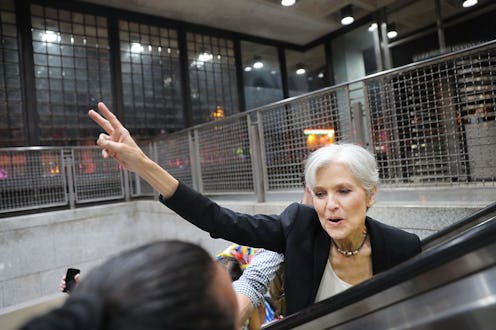News
Jill Stein's Skeptical Stance On Vaccinations
When it became clear that Bernie Sanders was not going to be the Democratic Party nominee, many of his supporters began looking into third party options. For many of them, the free market worship of Libertarianism was unpalatable, which is why the Green Party candidate Jill Stein seemed like something of a knight in shining armor to many who can't bring themselves to capitulate to Hillary Clinton. But while many are getting behind this Green candidate's #ItsInOurHands campaign, still others are hesitant to fully support a candidate whose ideas may do more harm than good. Below is a timeline of Stein's stance on vaccinations, which suggests that she's not the last hope liberals want her to be.
There are a number of attractive aspects of Stein's platform: universal, tuition-free higher education, a $15 minimum wage, and equality for immigrants, women, LGBTQ people and Native Americans. Unfortunately, those sunny platform points mask some darker issues. Stein has been sympathetic to people who believe vaccinations cause autism; she's said she considers autism a "public health calamit[y]"; she has refused to denounce the "anti-vaxxer" movement; she's clearly represented a party that is against sex workers' rights; and, just yesterday, she was revealed to believe that Wi-Fi could be hurting children's brains.
There's a lot to unpack here, so below is a timeline of Stein's stance on vaccinations and their purported (and false) links to autism, explained.
As far as anyone can tell, Stein's shifting stance on whether or not vaccines cause autism (they don't) wasn't public knowledge until May, when she was the subject of a Reddit "Ask Me Anything" (AMA) about her party and her presidential campaign. One user asked about Stein's thoughts on mandatory vaccinations, to which she gave a strange and half-baked reply regarding the agencies that regulate vaccinations, implying that there is reason to distrust said vaccinations. The AMA went largely under-reported because the political arena was still focused on Sanders, Clinton and Donald Trump.
In July, as the Democratic National Convention neared and Sanders supporters started to face the music, people predictably began looking into third party candidates, the search for which led many disillusioned Sanders supporters to Stein. On July 27, a Slate article about Stein's shifty history and beliefs began cropping up on social media. The response was rapid: Stein went from fringe candidate that few people had heard of to a notorious anti-vaxxer almost overnight.
Last weekend, The Washington Post interviewed Stein in an attempt to set the record straight on her position on vaccinations, which, somehow, only made matters worse. In the interview, Stein postulated and ho-hummed, engaging in that linguistic trait that seems natural to politicians where they manage to say almost nothing in a whole lot of words. The main point she tried to make was that there was, at one point, reason for concern about the links between vaccines and autism, but in doing so, she continued to pander to her anti-vaxxer base:
As a medical doctor, there was a time where I looked very closely at those issues, and not all those issues were completely resolved. There were concerns among physicians about what the vaccination schedule meant, the toxic substances like mercury which used to be rampant in vaccines. There were real questions that needed to be addressed. I think some of them at least have been addressed. I don't know if all of them have been addressed.
After the catastrophic Washington Post interview, Stein made a strange gaffe on Twitter in which she first posted that there is "no evidence" supporting links between vaccines and autism, but deleted the original tweet and opted for one that said she's "not aware" of evidence linking autism and vaccines. To say it was fishy is an understatement. The next day, more evidence for Stein's pseudo-scientific beliefs surfaced, in which she was recorded saying wireless Internet might be harmful to children.
Watching Stein go from a relatively-unknown third party candidate to a nearly universally-derided one has been understandably bizarre. But I don't feel too badly for her, especially considering she has tried to garner a low portion of votes from people who have and will continue putting everyone's children at risk because they believe autism is worse than measles.
